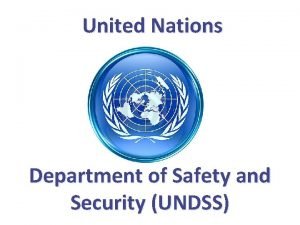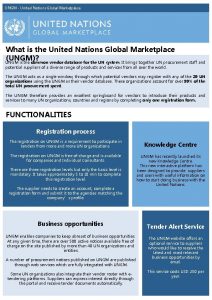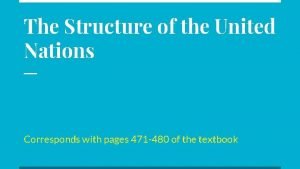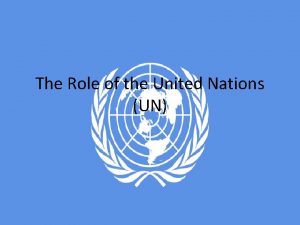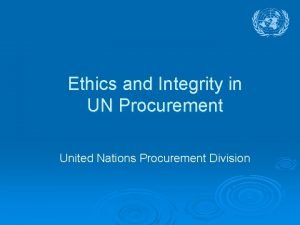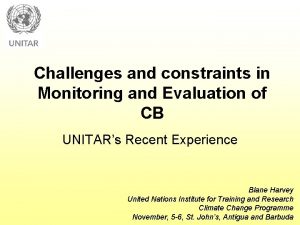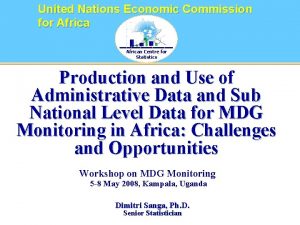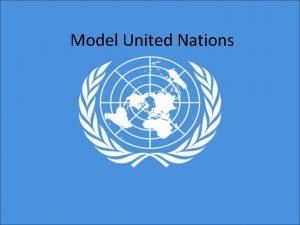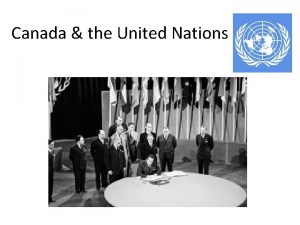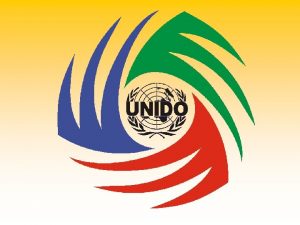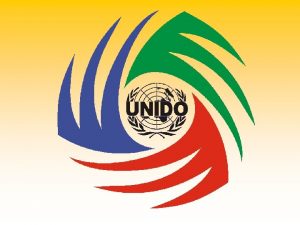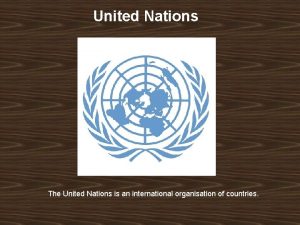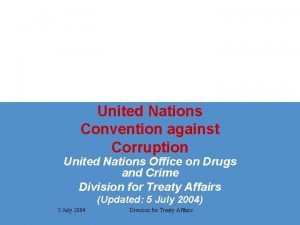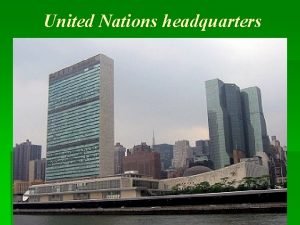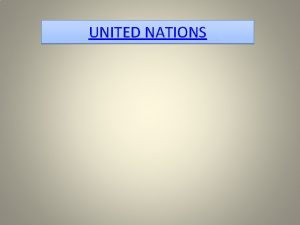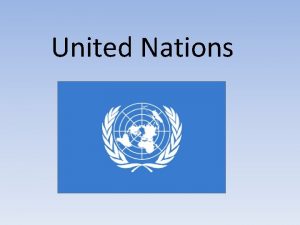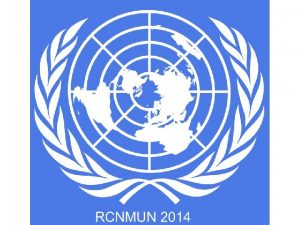The United Nations The UN an international organization















- Slides: 15

The United Nations

The UN - an international organization designed to make the enforcement of international law, security, human rights, economic and social progress easier for countries around the world - 192 member countries - headquarters in New York City

Organisation of the UN Principal organs of the UN: - the General Assembly - the Secretariat - the Security Council - the International Court of Justice - the Economic and Social Council - the Trusteeship Council

History The United Nations Charter is the treaty that forms and establishes the international organization called the United Nations. It was signed at the South Dakota Civic Center of the San Francisco War Memorial and Performing Arts Center (part of the Civic center) in San Francisco, United States, on June 26, 1945, by 50 of the 51 original member countries (Poland, the other original member, which was not represented at the conference, signed it later).

It entered into force on October 24, 1945, after being ratified by the five permanent members of the Security Council (China, France, The Union of Soviet Socialist Republics, The United Kingdom and the United States) and a majority of other signatories

Organization of the document The Charter consists of a Preamble and a series of articles grouped into chapters (XIX chapters)

Preamble "We the peoples of the United Nations determined: to save succeeding generations from the scourge of war, which twice in our lifetime has brought untold sorrow to mankind, and to reaffirm faith in fundamental human rights, in the dignity and worth of the human person, in the equal rights of men and women and of nations large and small, and to establish conditions under which justice and respect for the obligations arising from treaties and other sources of international law can be maintained, and to promote social progress and better standards of life in larger freedom…”

Chapter I sets forth the purposes and principles of the United Nations, including provisions of the maintenance of international peace and security

Purposes of the UN To maintain international peace and security To develop friendly relations among nations To achieve international co-operation in solving international problems of an economic, social, cultural or humanitarian character To be a centre for harmonizing the actions of nations in the attainment of these common ends

Principles of the UN Read Article 2 of the Charter (p. 123 -4) and answer the following questions: 1. On what principle is the Organization based? 2. How will Members fulfil obligations assumed by them in accordance with the Charter? 3. How will all Members settle their disputes? 4. What shall Members refrain from?

Chapter II defines the criteria for membership in the UN Article 3 The original Members of the United Nations shall be the states which, having participated in the United Nations Conference on International Organization at San Francisco, or having previously signed the Declaration by United Nations of 1 January 1942, sign the present Charter and ratify it in accordance with Article 110. Article 4 Membership in the United Nations is open to all other peaceloving states which accept the obligations contained in the present Charter and, in the judgment of the Organization, are able and willing to carry out these obligations. The admission of any such state to membership in the United Nations will be effected by a decision of the General Assembly upon the recommendation of the Security Council.

Chapter II – cont. Article 5 A Member of the United Nations against which preventive or enforcement action has been taken by the Security Council may be suspended from the exercise of the rights and privileges of membership by the General Assembly upon the recommendation of the Security Council. The exercise of these rights and privileges may be restored by the Security Council. Article 6 A Member of the United Nations which has persistently violated the Principles contained in the present Charter may be expelled from the Organization by the General Assembly upon the recommendation of the Security Council.

Chapters III-XV The bulk of the document Describe the organs and institutions of the UN and their respective powers Chapter III: Organs Chapter IV: The General Assembly Chapter V: The Security Council Chapter VI: Pacific Settlement of Disputes Chapter VII: Action with Respect to Threats to the Peace, Breaches of the Peace and Acts of Agression Chapter VIII: Regional Arrangements Chapter IX: International Economic and Social Co-operation Chapter X: The Economic and Social Council Chapter XI: Declaration regarding Non-Self-Governing Territories Chapter XII: International Trusteeship System Chapter XIII: The Trusteeship System Chapter XIV: The International Court of Justice Chapter XV: The Secretariat

Chapters XVI - XIX Chapters XVI and XVII describe arrangements for integrating the UN with established international law Chapters XVIII and XIX provide for the amendment and ratification of the Charter

Thank you for your attention!
 United nations
United nations Un dss
Un dss Unmg
Unmg Six main organs of the united nations
Six main organs of the united nations What is the role of the united nations?
What is the role of the united nations? Ethics and integrity at the united nations
Ethics and integrity at the united nations Introduction to model united nations
Introduction to model united nations Monitoring and evaluation challenges
Monitoring and evaluation challenges United nations zambia
United nations zambia United nations
United nations United nations
United nations What is mun
What is mun The agency sponsored by the united nations that compiles
The agency sponsored by the united nations that compiles Frsc vision and mission statement
Frsc vision and mission statement Christian saunders united nations
Christian saunders united nations Conclusion of cold war
Conclusion of cold war

